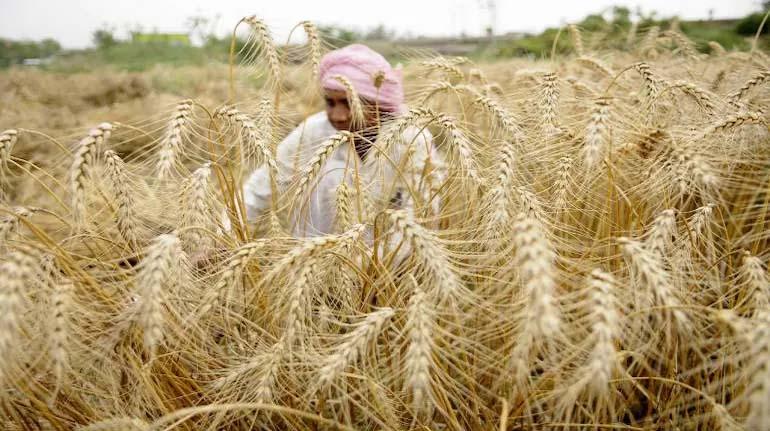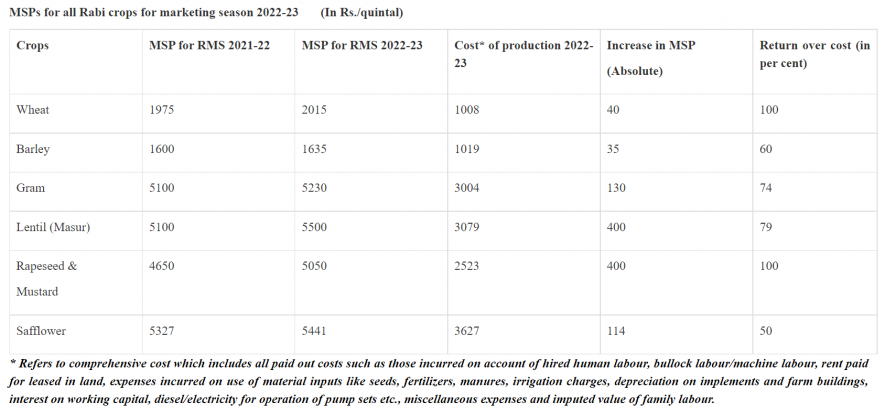AIKS Debunks GoI’s Claims of Highest Ever Rabi MSP Hikes

Shortly after the Centre announced the “highest ever” Minimum Support Price (MSP) for Rabi crops on September 8, 2021, the All India Kisan Sabha (AIKS) called the move a “blatant lie” that reduced MSP in real terms.
On Wednesday, the Cabinet Committee on Economic Affairs (CCEA) chaired by Prime Minister Narendra Modi increased the MSP for Rabi crops’ marketing season 2022-23 to “encourage crop diversification”.
The CCEA said that farmers will enjoy the highest returns for wheat, rapeseed and mustard followed by lentil, gram, barley and safflower. The highest absolute increase in MSP over the previous year was made for lentils, rapeseed and Mustard – Rs 400 per quintal – followed by gram – Rs 130 per quintal. Similarly, safflower received an absolute increase in MSP of Rs 114 per quintal compared to last year.
“The increase in MSP is in line with the Union Budget 2018-19 announcement of fixing MSPs at a level of at least 1.5 times of the all-India weighted average cost of production, aiming a reasonably fair remuneration for the fanners,” said the CCEA press release.
It estimated 100 percent expected returns to farmers over cost of production for wheat, rapeseed and mustard crops. Lentil crops can give 79 percent returns while gram crops may give 74 percent. Other crops like barley and safflower may give 60 percent 50 percent returns respectively.

Image Courtesy: Govt Press Release
“Increase in MSP of RABI crops will ensure remunerative prices for farmers,” said the government.
MSP increase, a BJP lie
Despite CCEA’s claims, farmer leaders have condemned the recently declared MSP hikes. AIKS General Secretary Hannan Mollah pointed out that the increase in wheat prices from Rs 1,975 per quintal to Rs 2,015 per quintal is merely a two percent increase – the lowest in 12 years. Similarly, MSP hikes of other crops range from two percent to eight percent.
“At 2021-22 costs if MSP was calculated as per C2+50 percent it should have been Rs 2,195.5 per quintal for wheat. A full year after, increased MSP for marketing season 2022-23 is still Rs 180 per quintal below this figure,” said Mollah.
Similarly, the MSP for barley using the C2+50 percent formula should have been Rs 2,106 per quintal instead of Rs 1,635 per quintal announced this year, according to AIKS. The implementation of the aforementioned formula is one of the major demands of the farmers’ struggle. Leaders have for the past year demanded that the government determine MSP using the Swaminathan Commission’s recommended method. Following this method, MSP of gram crops rises to Rs 6,018 per quintal; MSP of lentil crops rises to Rs 6,306 per quintal; MSP for rapeseed and mustard becomes Rs.5,205 per quintal; MSP for safflower becomes Rs.7362 per quintal.
“The losses to farmers will be much higher as per latest costs of cultivation. The CACP has not put up the Price Policy Report for Rabi Marketing Season, 2022-23 yet on its website,” said the AIKS.
Further, it argued that the lack of legal guarantee to MSP kept most farmers from selling their produce at MSP. Last year’s report on price policy also shows that in 2020-21 there has been a drastic fall in the number of beneficiaries who get even this unremunerative MSP, especially for pulses and oilseeds.
Therefore, the AIKS demanded that the central government come with a revised announcement in line with the farmers’ demand for MSP as per C2+50 percent.
Meanwhile, RSS-affiliated farmer organisation Bharatiya Kisan Sangh (BKS) welcomed the MSP hikes announced by the BJP-government. Yesterday, the BKS held nationwide protests to demand the guarantee of a profitable price for agricultural produce cultivated by small farmers. They had pointed out that most farmers will not get benefits as they were still unable to sell produce at that rate.
Speaking to The Hindu, BKS General Secretary Badrinarayan Chaudhary said that the union welcomes the attempt to diversify crops and encourage pulses and oilseeds. However, their protests will continue until their demands are met. The BKS observed mass protests in Gujarat, Uttar Pradesh, Tamil Nadu, Rajasthan, among other states.
Get the latest reports & analysis with people's perspective on Protests, movements & deep analytical videos, discussions of the current affairs in your Telegram app. Subscribe to NewsClick's Telegram channel & get Real-Time updates on stories, as they get published on our website.























